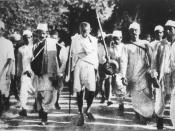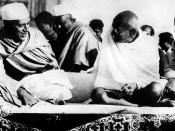Westernization had various impacts on several parts of the world. In general, it was not limited to economic changes, but brought cultural changes to an extent that varied from place to place, depending on the nature of the relationship with the West. Westernization impacted healthcare, language, and religion; and brought educational and marital changes. Complex relationships emerged while Westerners and non-Westerners introduced new challenging cultural values to other parts of the world. Several Asian leaders had varying emotions caused by these drastic changes to their environment. Some believed in the importance of Westernization, while others wanted to keep their traditional environment alive. These leaders, Fukuzawa, Vivekananda, Gandhi, Nehru, and Sun Yat-sen, shared their reactions and ways to cope with Westernization.
Fukuzawa, a Japanese Westernizer, believed that trying to forestall the West from taking over the way his country lived, was useless and vain. He basically said that it would be easier to just go along with the way the West lives and enjoy it.
Fukuzawa accepts the fact that no one can stop the coming of Western civilization, and he believes that it would be wiser to accept it than reject it. He believes this because, hypothetically, one man going against Westernization would do nothing to solve the problem. He thinks it is wiser to let it spread and allow everyone to get used to it. Fukuzawa thinks that his neighboring countries, China and Korea, show very few likenesses to Japan. He said their truths and principles are ignorant because they believe they can avoid the effects of Westernization, such as transportation. China and Korea are believed to be of no help to Japan in producing a better Asia because they have seemed to be arrogant in their ways of thinking. For example, they hold true to...


